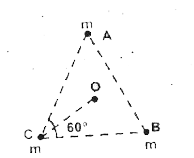One of the forces acting on the particle is conservative, then
(a) Its work is zero when the particle moves exactly once around any closed path.
(b) Its work equals the change in the kinetic energy of the particle.
(c) It does not obey Newton's second law.
(d) Its work depends on the end points of the motion, not on the path in between.
The correct Answer is:A, D
It is the defination of a conservative force. Increase in KE will be due to work done by other forces also.
Topper's Solved these Questions
- WORK, POWER & ENERGYBOOK - CENGAGE PHYSICSCHAPTER - WORK, POWER & ENERGYEXERCISE - Linked Comprehension
55 Videos
- WORK, POWER & ENERGYBOOK - CENGAGE PHYSICSCHAPTER - WORK, POWER & ENERGYEXERCISE - Integer
14 Videos
- WORK, POWER & ENERGYBOOK - CENGAGE PHYSICSCHAPTER - WORK, POWER & ENERGYEXERCISE - Single Correct
100 Videos
- VECTORSBOOK - CENGAGE PHYSICSCHAPTER - VECTORSEXERCISE - Exercise Multiple Correct
5 Videos
Similar Questions
[" Question "7],[" The total work done on a particle is equal to the change in its kinetic energy "],[" o always "],[" only if the forces acting on the body are conservative "],[" o only in the inertial frame "],[" only if no external force is acting "]
View SolutionThree particles, each of mass m are fixed at the vertices of an equilateral triangle of side length a. The only forces acting on the particles are their mutual gravitational forces. Then answer the following questions.

Force acting on particle C, due to particle A and B
View Solution
Knowledge Check
One of the forces acting on a particle is conservative then which of the following statement (s) are true about this conservative force
AIts work is zero when the particle moves exactly once around any closed path.Bits work equals the change in the kinetic energy of the particleCThen that particular force must be constant.DIts work depends on the end points of the motion, not on the path between.A particle is acted upon by only a conservative force F=(7ˆi−6ˆj) N (no other force is acting on the particle). Under the influence of this force particle moves from (0, 0) to (-3m, 4m) then
Awork done by the force is 3 JBwork done by the force is −45JCat (0, 0) speed of the particle must be zeroDat (0, 0) speed of the particle must not be zeroIf the resultant of all the external forces acting on a system of particles is zero, then from an inertial frame, one can surely say that
Alinear momentum of the system does not change in timeBkinetic energy of the system does not change in timeCangular momentum of the system does not change in timeDpotential energy of the system does
Show that if the force acting on a particle is zero , its momentum will remain unchanged.
View SolutionThe momentum of a moving particle given by p=tlnt. Net force acting on this particle is defined by equation F=dpdt. The net force acting on the particle is zero at time
View SolutionStatement 1: A charged particle undergoes non-rectilinear motion in a constant magnetic field. The only force acting on the particle is the magnetic force. Then kinetic energy of this particle remains constant but momentum of the particle does not remains constant.
Statement 2: A force that always acts on the particle in direction perpendicular to its velocity does no work on the particle. But whenever a force acts on the particle, momentum of the particle does not remains constant.
View SolutionIf is the force acting on a particle having position vector and be the torque of this force about the origin, then-
View SolutionIf the resultant of all the external forces acting on a system of particles is zero. Then from an inertial frame, one can surely say that
View Solution
